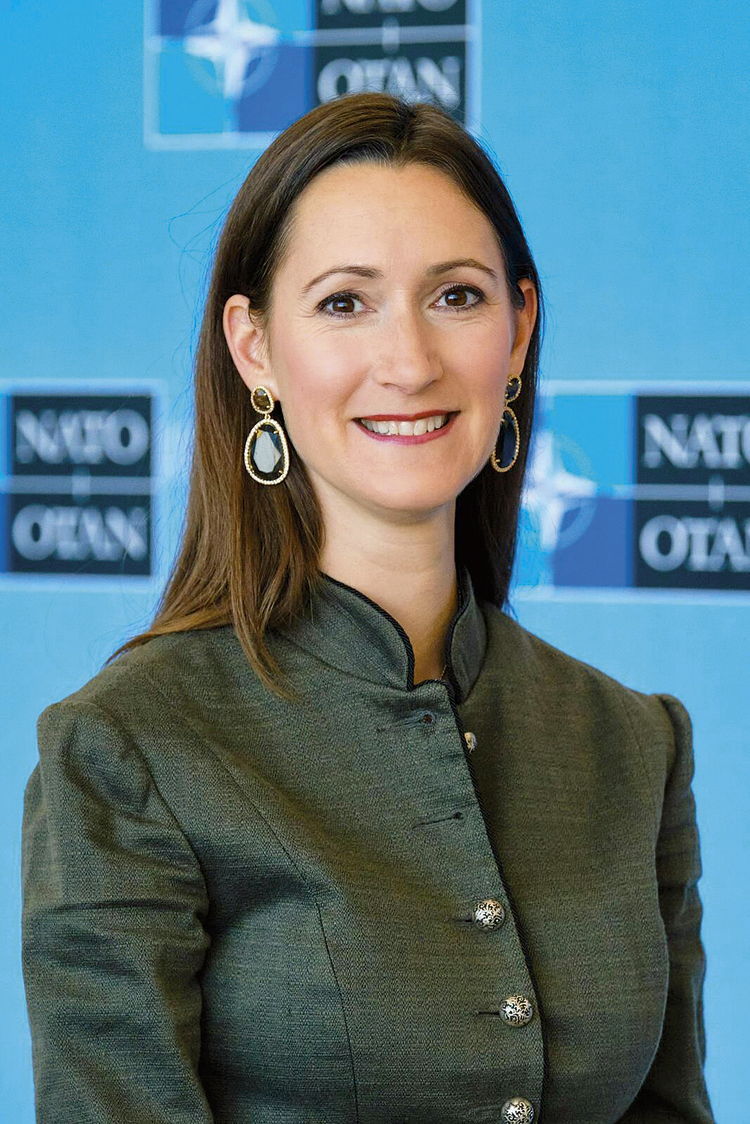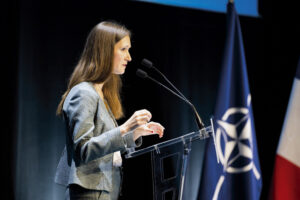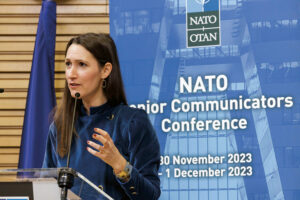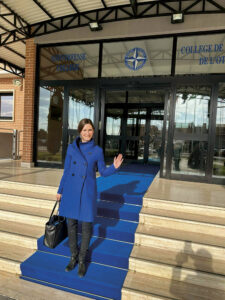Trident Juncture 15, a month-long exercise engaging over 36,000 participants from thirty Allied and Partner…
NATO belongs to you, and we need you
Interview: Marie-Doha Besancenot, Assistant Secretary General for Public Diplomacy
NATO is a politico-military alliance. Both elements are very important and reinforce each other as we strive both to avoid conflict and to being prepared for it should it happen – it is key also to understand the role of the North Atlantic Council, with its consensus rule: no action can ever be take full consent of every one of its members. It is the DNA of NATO

You took office a little over half a year ago. Could you tell us more about your personal and proffesional background? Have any personal or professional experiences foretold that this was your future career path? Is this the biggest challenge in your career?
Yes, it has been six very intense months! There is never a dull day at NATO. The challenge is finding the ideal balance between time spent with the teams implementing the strategy, time spent abroad sharing NATO’s contribution to today’s challenges, and time spent participating in NATO life and processes, with committees, NACs and Ministerials all aimed at forging consensus and unity among 32 different nations. All three areas are captivating and complement each other. The stakes are so high right now and I feel very privileged to be heading the Public Diplomacy Division and working closely with each of our teams of experts. As for me, Russia’s brutal invasion of Ukraine was a wake up call that led me back to public service. When the ASG PDD position at NATO was advertised, I felt everything was coming together. After six months at NATO, the intensity has not abated. I’m energized by what I’ve learned and the opportunities we have before us.
 What are the main tasks and responsibilities of NATO’s Public Diplomacy? How has the digitalization of public diplomacy transformed your norms, values and working routines? What are the main challenges of developing a unique public diplomacy and communication strategy when you represent an Alliance of 32 members?
What are the main tasks and responsibilities of NATO’s Public Diplomacy? How has the digitalization of public diplomacy transformed your norms, values and working routines? What are the main challenges of developing a unique public diplomacy and communication strategy when you represent an Alliance of 32 members?
Our main tasks are delivering on our Secretary General’s priorities, preparing the Washington Summit and seizing the opportunity of NATO’s 75th anniversary to make NATO’s story better known to the public! Externally, our focus is on outreach and impact—ensuring we are reaching the right audiences with persuasive and credible messages. And that is of course where our digital products extend our reach exponentially. I’m excited about the creative people on our team—they are at the forefront of digital communications, as you can see by a quick journey through our social media accounts and website. Our values have not changed, but we must continually innovate and learn to reach audiences where they are. Internally, our focus is on establishing an efficient continuum between the key areas of expertise sitting within the division, from analysts of the information environment to the teams permanently facing the media daily. We have tremendous capabilities, but we must be disciplined about collaborating with each other to ensure we’re fully utilizing our talents and resources and taking advantage of the expertise that resides with our 32 members.
How has the public perception of NATO changed, especially after the Russian aggression against Ukraine? Which NATO values are particularly prominent now? Are we more aware of the importance of NATO for our security?
We have seen significant spikes in support for NATO in several countries since Russia’s full scale invasion of Ukraine. There is much greater interest in knowing what NATO is and does – we have seen that in NATO featuring in the top Google searches in many countries. What we must do now is ensure that the audiences receive credible information about who we are. Especially that we are a defensive alliance and are committed to defending every inch of NATO territory, but also that we are united by a common set of values rooted in freedom and democracy. In a world of heavy disinformation targeting our audiences, and an increasingly fragmented information environment, it’s more challenging to effectively tell our story. Our goal is to better anticipate what is likely to mark the information space and stay ahead of the hostile narratives. Globally, we are more aware of security and defence challenges across the Alliance, but we remain agile and address each audience with the more relevant messages that will resonare with their very own concerns. We also plan to deliver well planned communications campaigns, while remaining agile and able to adapt to ever changing situations.
You are a civilian who holds an important position in the Alliance. But NATO is still perceived as predominantly a military alliance. Based on your professional experience in diplomacy and the private sector, how much different is it to be a part of NATO ‘s International Staff and how has your previous experience helped you in your current duties?
Indeed, I am a French civil servant with 20 years experience both in government and private sector positions. I loved both worlds. In 2009, I joined the office of the French Prime Minister as adviser responsible for speeches and communications. In 2012, I went to London as cultural attaché at the French Embassy. I entered the private sector in 2014, when I joined Allianz France as Head of the CEO’s office, then Director of Public Affairs and Corporate Social Responsibility, and finally Head of Communications, Brand and Corporate Social Responsibility. These positions have led me to transform teams of communicators to improve our outreach, look for impact, assess it, work on the likeability of the brand… All these goals are entirely valid in public service and in an international organisation.It also applies to the military, as recruitment is a challenge everywhere, and being able to share and articulate a sense of purpose is jey to every organisation. I am happy to keep up the good work of NATO and work to stay at the forefront of rapidly changing technology and digital communications.
How important for public perception and support is it to communicate that NATO is more than just a military alliance?
NATO is a politico-military alliance. Both elements are very important and reinforce each other as we strive both to avoid conflict and to being prepared for it should it happen – it is key also to understand the role of the North Atlantic Council, with its consensus rule: no action can ever be take full consent of every one of its members. It is the DNA of NATO. We coordinate on a daily basis with our military colleagues. The connection between the military and political elements is essential to provide for our collective defense and ensure continued public support from the citizens we serve.
 Kolinda Grabar Kitarović held the position you hold today as the first woman Assistant Secretary-General ever in the history of NATO. How significant was her mandate? How is NATO today dedicated to promoting gender equality, women’s participation and empowerment?
Kolinda Grabar Kitarović held the position you hold today as the first woman Assistant Secretary-General ever in the history of NATO. How significant was her mandate? How is NATO today dedicated to promoting gender equality, women’s participation and empowerment?
I was very happy to meet her at the last NATO Summit in Vilnius indeed! I follow in the footsteps of a number of women trailblazers at NATO. Not only Kolinda, but my predecessor Baiba Braze, and Oana Lungescu was just succeeded by Farah another strong female leader, as new NATO Spokesperson. Being a senior female NATO leader means you must act as an example to younger generations at NATO, promoting the right kind of values and behaviours. I believe it is very possible to be a strong and capable leader while showing you care, allowing yourself to be empathetic. There is no need to display specific virility in order to be able to take tough decisions in complicated environments. NATO provides many possibilities for that, but of course, one must be prepared to work in a predominantly male military environment… for now. In PDD, we have a very balanced team. Our diversity is what makes us take the right decisions and serve our audiences best. One of the key areas we are always promoting is Women, Peace and Security.
 How do you perceive Croatia’s role in NATO? What would be your key message, especially for the young people, when contemplating future of NATO and benefits it brings Croatia, but also all its Allies?
How do you perceive Croatia’s role in NATO? What would be your key message, especially for the young people, when contemplating future of NATO and benefits it brings Croatia, but also all its Allies?
Your Ambassador is very active and highly visible as the dean of Allied Ambassadors! Like NATO, Croatia celebrates an anniversary this year. While the Alliance has reached its 75th anniversary, Croatia is marking 15 years in NATO this year. We are a stronger, more capable Alliance with Croatia as a member, and I know NATO is grateful for Croatia’s many contributions. It is worth recalling that NATO’s relationship with Croatia goes back even further than 2009. For example, Croatia sent troops to NATO’s ISAF operation in Afghanistan even before joining the Alliance. Croatia is also clear-eyed about the challenges facing NATO, including in the Western Balkans, with outside interference and increasing disinformation. As we look to support vulnerable NATO partners in the region such as Bosnia Herzegovina, having a trusted, solid Ally like Croatia is vital. For the youth of Croatia, your participation and engagement is vital. All of the reasons that led the people of Croatia to join NATO 15 years ago—the idea of uniting with like-minded nations to better protect your freedoms and sovereignty—exist still today, and I would argue are even more important as Russia wages a brutal war against Ukraine and seeks to sows instability and malign influence throughout Europe. But we need the voices, the fresh perspective, of the next generation, to ensure we are constantly adapting and ready to confront the challenges and opportunities of the future. I encourage you to connect with us online, to participate in the annual NATO youth summit, and to consider internships and jobs at NATO. NATO belongs to you, and we need you.
Authors: Domagoj Vlahović, Morana Bencal, Photo by: NATO
